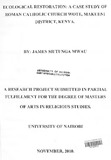| dc.description.abstract | The life support systems of our environment have in no doubt been intensively and extensively destroyed. It is thus not surprising that interest in ecological restoration is growing rapidly worldwide because the crisis has put humanity's survival at stake. Thus the need for urgent measures towards ecological rehabilitation is inevitable if the trend has to be reversed.
The nature of the ecological crisis, which is a global concern and a common threat to all, demands contributions from all spheres of our culture - politics, economics, science, philosophy, and Religion. Unfortunately the religious dimension has almost been ignored and put at the periphery on ecological issues.
This study, therefore, sets to investigate, through a case study, the role of religion in ensuring environmental sustainability. The findings of this study have been collected from both primary as well as secondary sources. The primary methods used include in- depth interviews, questionnaires and observation. Secondary sources include books, magazines, newspapers, journals, reports, public lectures and the internet.
It was the objective of this study to explore the Karnba traditional ways of conserving the environment, the role of the Roman Catholic Church Wote on ecological rehabilitation, the impact of the ecological crisis on various aspects of human life and the response of the local community towards ecological restoration. The study begins its inquiry by giving a brief overview of the place of religion in environmental matters, particularly Christianity, Buddhism and African traditional religions. The study affirms that all world religions and the traditional religions have a fundamental place in reversing the ecological crisis by utilizing the religious insights on ecology found in them.
The study shows that environmental destruction in Wote area is caused by poverty, ignorance, laxity by law enforcers, population growth, unemployment and lack of livelihood skills. The consequences of environmental degradation in Wote are found to affect all aspects of human life Agricultural production, quality of life, human rights, human relations, scarcity of water, and poverty. The study validates the hypothesis of the study that there exists a very strong relationship between poverty and environment and that for the human rights to be upheld, the rights of nature must also be respected.
Further into the study, the investigations illustrate how the Roman Catholic Church Wote can utilize the concept of inculturation as one way to environmental stability. This acknowledges the indigenous people and the traditional methods of environmental management and sustainable development. Small Christian communities (SCC) are seen as an effective avenue of this inculturational approach towards ecological restoration. Attempts are also made to answer questions of how, why and when the disconnect between the Akamba traditional view of cosmology and the 'modem' way of perceiving nature occurred.
The study further shows how the local community of Wote has responded to the ecological crisis through the establishment of communities of hope. Moreover, an intrafaith relation on ecological matters is also seen to take root in Wote after the realization that the crisis is a common threat for all. It is concluded that ecological restoration in Wote, either through inculturation, or creation of environmental awareness, may be a far fetched dream or elusive if no priority is given to poverty eradication, sustainable livelihoods and internalization. The study thus suggests a number of ways to the church, the government and the local community- that would facilitate ecological
sustalnability in Wote.
In a nutshell, it is mainly through human actions that the world is undergoing grave ecological devastation and there is now no doubt, at all, that alllifeforms including humanity are faced with the crisis. Therefore the decisions and actions taken now will, to a large extent, determine the condition of our environment we will pass to fosterity.
If no change of our lifestyles and practices, that are unfriendly to our environment, the future generations may receive the life- support systems in conditions that can not sustain life for long. For that reason, it behooves all stakeholders to arrive at the decision to initiate comprehensive ecological rehabilitation measures. | en_US |

